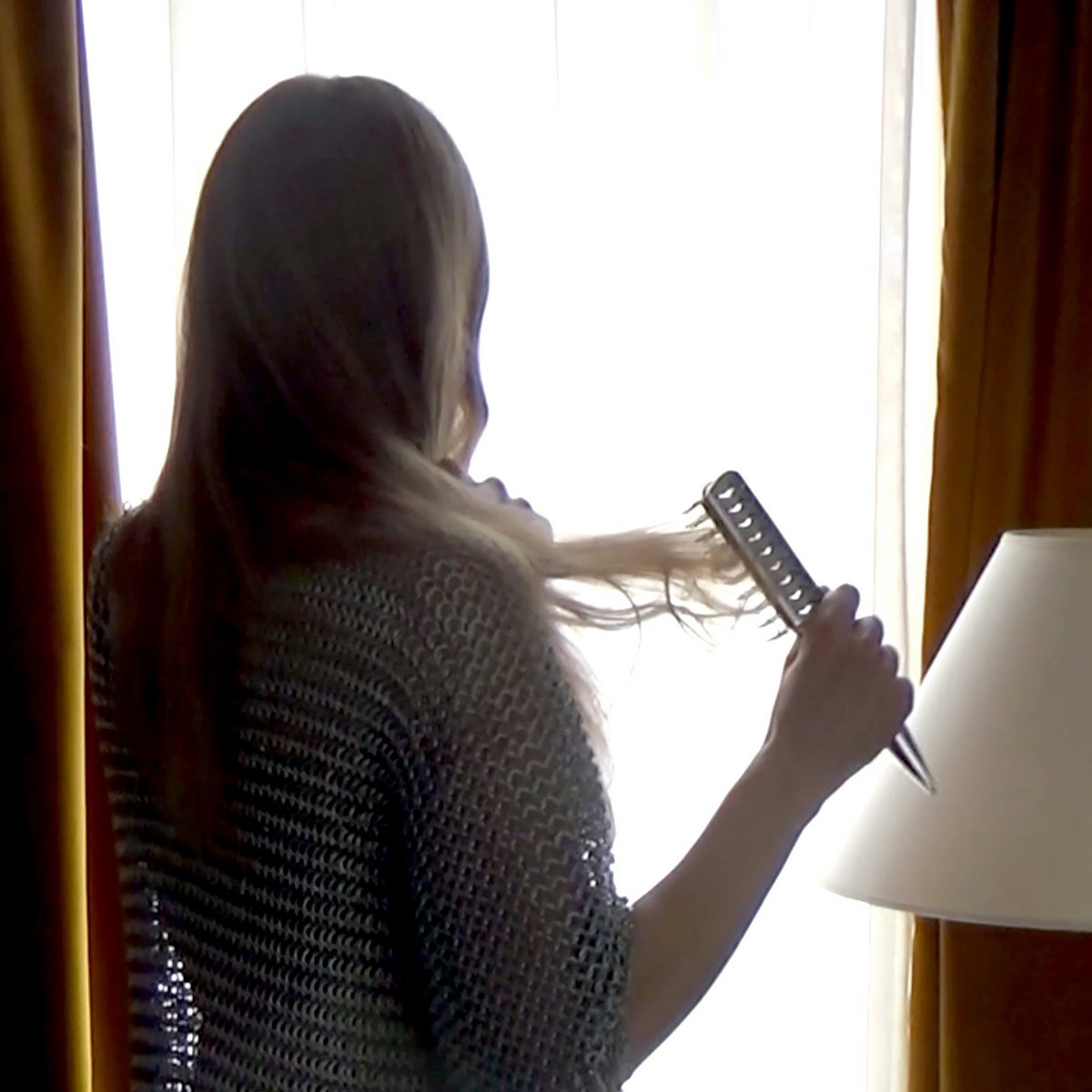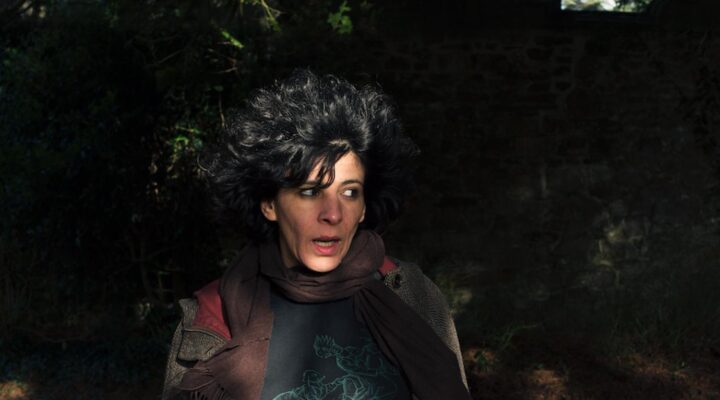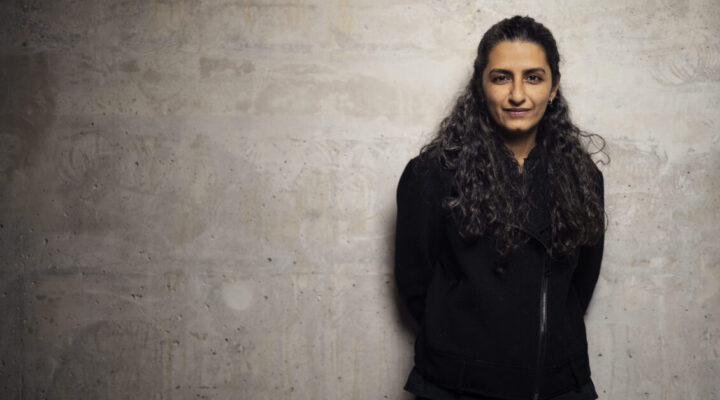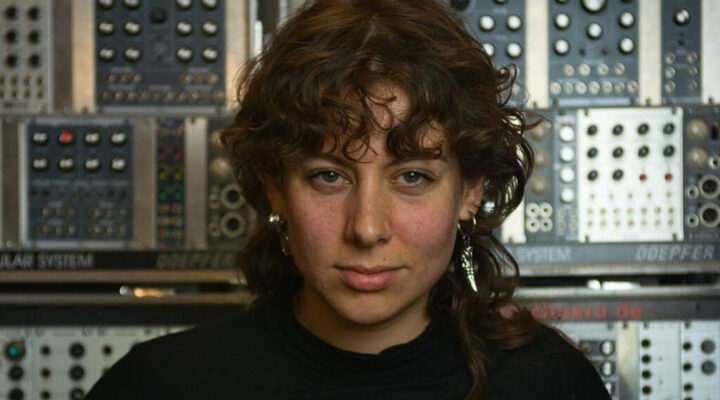An Interview with ML Buch
Text by Marieke de Graaff and Sydney van Nieuwaal
Photo by Stephanie Staal
ML Buch is a composer, producer and singer who explores intimacy, space and (modern) love through her word and sound. While the birds of Denmark and The Netherlands adopted our Zoom meeting as a window for their compressed conversation, we had a talk with her. In concert with their chirps and a feeble internet connection we sifted through our concepts of company.

Sydney: Hi!
ML Buch: Hello!
Marieke: Hello! How are you?
ML: I’m good, thanks! How are you?
M: Good
S: Good! Are you in your car?
ML: It’s my car, yes!
S: You use your car as a studio, right?
ML: I do, I guess! You know, I can drive to the ocean to record. I like to be by the ocean. It’s a very calming and creative place for me to be. I don’t know, it’s like some sort of portal for me.
S: And why is that?
ML: I don’t know, it’s… I feel like asking you. Have you been by the ocean and just felt like ‘wow’?
S: Yes! It opens up everything. It relativizes.
ML: It’s like an opening or a beginning. It’s this huge open space of possibilities. So, I’ve mostly used my car to record vocals. I mean, the sound is pretty horrible, but maybe it creates a more intimate space for the vocals to be immersed in. Perhaps you can’t hear it, but you can feel that it’s recorded a little differently. Well, maybe not, but the process is very important to me.
M: Maybe that’s even more important than what the result is.
ML: Yeah, well… I believe that, as a whole, it will make sense for the listener as well.
S: When you record in your car, do you drive it to different places and have a new scenic backdrop every time, or is there a specific spot you always go to?
ML: Sometimes it’s the same spot. It also matters how many people are walking by or looking at me. It’s nice if it’s a little isolated. But, I have driven around the coastlines in Denmark.
S: Are you at the coast right now?
ML: Yes, it’s like two hundred meters that way!
M: Wow. It looks so sunny.
ML: Sorry? Are you asking if it’s sunny? I think you’re falling out a bit.
S: Is the connection ok?
ML: It’s okay, it’s not great, but yeah, we’ll figure it out.
S: If you can’t hear us properly please ask again!
ML: I will.

S: So, this issue of Sprout carries the theme ‘company’. What does that term invoke to you?
ML: The first thing I’m thinking of is balancing solitude, or the need to be by myself, and the need to be with other people, to relate to other people and to be seen by other people. So, I think of the word balance. I’m thinking about that quite a lot actually, as I really need it to drift about in the world quite a lot to be able to have a creative output and to figure out what I’m going to say and do.
S: I see.
ML: So it’s… ‘company’ for me is… Being in nature is very important to me. You know, being in the company of all those other living things. And then, of course, I love being with my friends and family. It’s very important for me to have them close. And at the same time, it’s important for me to have periods where I’m not with people all the time. I think of the art of balancing those two needs. Those ways of being in the world. The need for intensity and the need for peace and calm. With and without other people.
S: I think it’s beautiful that you incorporate solitude within company. Also, while thinking of this theme myself, I initially thought of ‘who’ in company, but your concept of company also asks ‘what’ surroundings keep you company.
ML: Totally! I think being by myself I can open up my senses in a different way, because I’m not relating to any person, but I can imagine a non-specific person or a figure. Imagining someone that doesn’t have a specific body. A ‘you’. A ‘you’ that I also communicate with through music. Or a ’you’ that I can give something to, or to care for in a way. Someone or something imaginary that makes me want to feel like you are not alone. I know it sounds kind of crazy, but that’s what makes making music important to me. Something more ephemeral. Is that a word? Ephemeral?
S: I’m not really familiar with that word!
ML: Do you understand what I mean? Like more spherical…
M: As in, not solid?
ML: Exactly. I’m writing music about solid / not solid at the moment.
M: I think this connects quite well to another question I wanted to ask you. To me, in Skinned it feels as if you are directing your words in an utterance towards another. As if they’re addressed to someone. The two of you come together through a field of screens, sounds, and pixels. How can you identify yourself in these spheres when the other is not there? Can the other exist on its own, or do you need its company?
ML: It’s all in my imagination. I think I experience something in communication or in a relationship with a person, and I take notice of that feeling or experience. All those screens are mirrors as well, you know. Reflecting surfaces. And they are everywhere. I’m not sure I’m all that interested in the digital world or sphere. I’m just trying to reflect on those interfaces. Like, the record is called Skinned. The skin is the surface, or it’s what holds our organs, bones, blood and body water together. The world is there and you are here. So, it’s an interface as well.
M: As a translation, maybe?
ML: Yeah, yeah… Maybe also like a portal or an entrance. I don’t know, it’s all about connection and wondering how I can connect. Sometimes it’s connecting to another sphere. Maybe we don’t have to be in the same room to be connected.
S: Or when someone puts on Skinned and listens to it, there’s a connection there as well.
ML: Yeah, music!
S: Your vocals recorded in your car in Denmark, being played by my speakers in my house here in Amsterdam.
ML: Exactly. That’s amazing for me! I mean, it’s so great that I can make music that you can actually use in the way you want to, and that makes sense in your life. The internet is a great way for me to get the music out there in a low-key way.

S: Do you feel comfortable with people using your music – your emotions, thoughts and creative processes – in their own way, or is there some control that you still want to enact there as well?
ML: I definitely feel that I’m in control of the whole piece. You know, the whole album or all the videos. The whole world that I’m creating needs to be like I envision it, but when it’s out there… Just the thought of people using it the way that makes sense for them is, is… great! I really love it. I don’t think I have a need to communicate that much. When it’s out there, it’s yours. It’s a very nerve racking thing to release music and have people judge it. As a private person, I feel it’s quite a big deal for me to be ‘out there’ as a person. I like for the music to be out there, you know, but maybe not myself all that much.
S: I see.
ML: I mean, sometimes people write me, or tell me about their experiences with the music. That makes me very happy. That’s beautiful. But, then, I try to forget about it. I try to forget about what everyone is saying to be able to make something new at all. That’s why being in my own company is very important to me: to find my own voice. I find it hard to figure out what’s my voice when there’s so much noise all the time. Or when there’s just so much communication all the time.
S: Yes! If you try to find your voice in the midst of noise, then you’d have to scream a bit to even hear it. When you’re in solitude you could just whisper and listen to all the little nuances and details in your own voice. Rather literally.
ML: Yes. I can just accept – …
– … –
S: Hello?
ML: Hey, hey!
S: Ok, we’re back. Big apologies, the internet connection was lost!
ML: Oh, okay! But it’s back.
S: Marieke, maybe we should switch laptops. We can just log in on Zoom and then- …
– … –
S: All right I think we’re back again, I’m sorry.
ML: But, hey; you’re in Amsterdam, I’m in Denmark and we can communicate!
S: Marieke just said that even the birds from Denmark and Amsterdam were communicating!
M: They were chirping to each other!
ML: Wow. They have a huge repertoire, it’s fascinating! Do you remember what we were talking about? Uhm… Ah, about finding your voice!
S: Yes!
ML: I was saying that sometimes drifting about, observing and using my senses makes me forget about myself. I forget to ask who I am, what I’m doing, what I am to other people and where I’m going. All those questions that you have in your head a lot can disappear sometimes. Don’t you think it’s nice sometimes to just not have the computer running? There was this other question of yours that I read beforehand; “what does good company mean to you?”. That’s also a place for me where I can forget who I am, where I’m going and what I’m going to become. That’s when I’m with funny, generous, interesting and loving people.
S: Do you think that it’s also important to feel safe?
ML: Yes, to feel safe is very important to me. Also, sometimes it’s okay to be in a big crowd where you don’t necessarily know everyone. Sometimes it’s very nice to be with a huge amount of people and immerse yourself in that.
S: This made me think of this lyric by Kurt Vile. I think he said something along the lines of: “Sometimes you gotta be alone to figure things out. You gotta be alone, even when in a crowd.” Something like that. Being alone in a crowd is very different from being alone on yourself.
ML: I think of the word balance again. I don’t know about you, but I need both. I just need to figure out a nice way of bouncing back and forth between those two ways of existing.
S: I have a bit more of a direct question to your music. You’ve described Touching Screens as a dad rock / dad pop inspired song, in a Dire Straits, The Police kind of way, yet armed with the idea how an interpretation like that would sound in a ‘very synthetic universe’. Also, you’ve stated that you were trying to learn guitar in a synthetic way – feeding the computer audio and then having that translated to MIDI. How did you reach this synthetic field? How did you end up engaging with it the way you do?
ML: I don’t know… It’s the computer. I guess it’s a sort of canvas, right? It can be like a conversation partner. Even though I’m making music very analog – for instance, I play guitar – I am thinking about how this could be translated by some plugin or different fun technologies that try to understand a human way of playing. It’s really fun to feed it something that’s hard for it to understand. It ends up being a computer trying to understand human feeling and timing. Sometimes it translates in a very fun and weird way. I like to take that material and then try to understand it as a human, and then feed it back.
S: That’s a conversation!
ML: It is. And you know, just sitting down with a guitar is like… I start with the same chord and then comes the next… So, it’s also a way of hacking your own work process. Feeding the computer something, getting something back and creating this body of material that you can sculpt and cut away from. Like working with clay or something. Trying to transform the material to create coincidences and surprises.
S: This reminds me of an interview in the previous issue of Sprout, with Hunter Hunt-Hendrix of Liturgy. Hunter described how the electric guitar was supposed to be this glassy sounding instrument initially, but when people made amplifiers to increase their volume, distortion would occur. This was a problem initially – an accident, or a coincidence. However, people started to use the distortion in different ways and from thereon an entire genre of music evolved.
ML: Yeah! I mean, that’s how I try to create a little moments of magic, or of something special. It could be me singing in a car, and then the voice hits the glass. The sound of the reflection sounds weird, but it sounds weird in a way that I could never create digitally. That makes me want to be adventurous.
S: To me, the final track of Skinned, ‘Mw’, feels like a big moment of release in relation to all songs prior. Overall, I would say, the record feels more controlled and perhaps even polished. Also, the first half of the record features many more moments with your voice – on first glance at least. I personally read the second half of Skinned as a product of the tension you touch upon lyrically in the first half. Is there a narrative or a distinct relationship between the two halves of Skinned?
ML: Well, the way the tracks are knitted together is done very intuitively. So, sometimes I can answer questions like these, but sometimes it was an intuitive decision that I made. To me, the record is about moving through different spaces. Sometimes those spaces are very intimate, containing very few instruments and like, maybe have my voice very, very close. But sometimes there are more pulses and it’s more like a floating movement. I think it makes sense in a way to move from something that’s a bit more like a ‘tune’ to more open spaces. I’m thinking of making music more like making architecture, or as placing roles in a space. It’s almost like the record is falling apart. Or more… I think I like it when things are integrating and disintegrating. It’s breathing, it’s swelling. It’s bursting. It’s being silent.
M: Like an organism maybe? Never fully solid.
ML: Yes!
M: It feels as if we rounded up the conversation, thank you.
ML: It was nice talking to you. Have a good day! Bye!
Listen to ML Buch’s latest record Skinned here.



